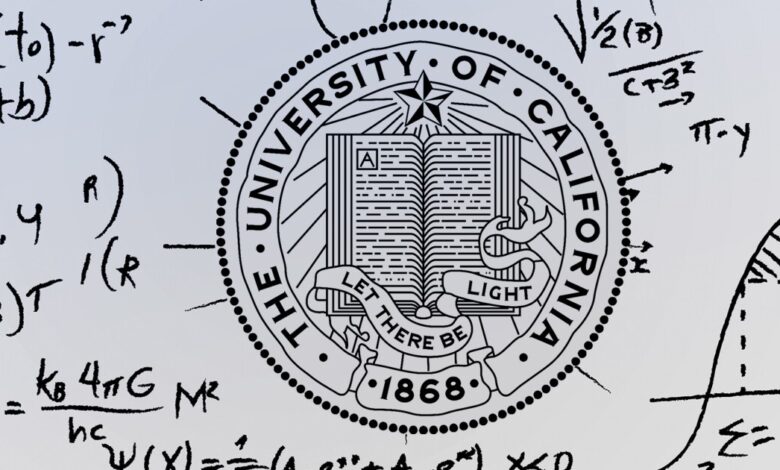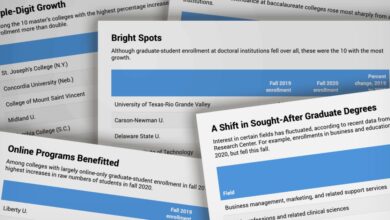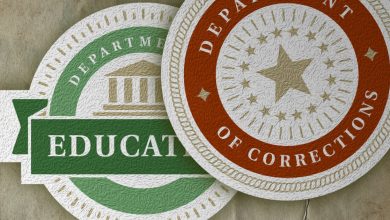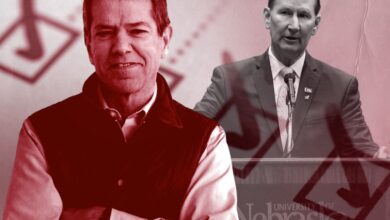The University of California Is Reversing Course on Its ‘Data Science’ Admissions Standard

A University of California academic-governance panel has voted to undo a controversial admissions standard that professors fear is not preparing students for college-level math, just as it is on the cusp of being written into statewide policy for high schools.
On Friday, a systemwide faculty committee that oversees admission policies voted to stop high-school data-science courses from counting toward the UC’s math requirement, according to an email obtained by The Chronicle. Since this policy was adopted in 2020, faculty members across California have expressed concern that the UC system is rubber-stamping courses that bill themselves as “data science” but that do not impart the algebra needed to major in data science or other science, engineering, math, and technology majors, as The Chronicle reported last week.
The governance panel — called the Board of Admissions and Relations with Schools (Boars) — seems to have delivered a major setback to these popular courses. “Introduction to Data Science” is taught at some 165 high schools across California, claims to have been taken by 42,200 students to date, and was developed at the University of California at Los Angeles by Robert L. Gould, a statistics instructor.
Another course, “Explorations in Data Science,” is taught at more than 105 schools in the state and has been taken by more than 160,000 students, according to Jo Boaler, a Stanford professor of mathematics education who helped develop the course at Youcubed, a Stanford research center. Gould and Boaler have said that their classes teach the useful skill of crunching real-world data, and engage students who might otherwise drop out of math and won’t need calculus in their careers.
But on Friday, Boars, which consists of representatives from each UC campus, voted unanimously to drop data science from its math admissions standards, two people who were present told The Chronicle.
“Those courses, especially ‘Introduction to Data Science’ and Youcubed, should not have been approved as an advanced math course or a replacement for algebra II,” said one attendee, who requested anonymity to discuss the confidential deliberations. They said that none of the members tried to defend the policy.
The UC director of undergraduate admissions confirmed the vote in an internal email obtained by The Chronicle. She also wrote that Boars will establish an advisory group this fall “to address definitions of ‘advanced math.’”
The vote throws into question California’s math framework, which gives guidance to the state’s K-12 schools about how to teach math. After being in the works for three contentious years, the third and latest version was released on June 26. It currently encourages high schools to consider offering data science — and cites the UC’s data-science policy as evidence that the UC system will “value a range of mathematics courses as pathways to college.”
The California Board of Education is scheduled to vote on the framework on Wednesday morning. In a public comment submitted late last week, Barbara Knowlton, the Boars chair, indicated that her group was having “significant discussion” about whether the currently approved data-science courses would continue to count.
As of Tuesday afternoon, the Boars vote to ditch the policy had not been announced. On Monday night, Knowlton told members that she did not think that the group had the authority to implement the vote. “I do not think we have the power to do this,” she wrote in an email obtained by The Chronicle.
Neither Knowlton nor a spokesperson for the UC president’s office returned requests for comment by publication time.
A spokeswoman for California’s Board of Education said it was aware of the panel’s vote. “Given the decision, the Board would consider amendments to the framework during deliberations on Wednesday to ensure framework language is correctly aligned with the UC system,” the spokeswoman, Janet Weeks, said by email.
Traditionally, the UC system requires applicants to take at least three years of high-school math, including algebra II. Its current troubles began in 2020, when it expanded its definition of acceptable advanced-math courses.
In May of that year, an advisory group of mathematicians and statisticians, convened by the UC administration, recommended allowing data science and other courses to count toward the math requirement. One of the advisers was Gould, the UCLA statistician who’d led the development of “Introduction to Data Science.” That October, the Boars members unanimously adopted the proposal.
At the time, Gould called the decision “a great relief.” “There are enough old guards out there in the UC math system that a serious challenge to revising the policy was a real possibility,” he wrote to colleagues on October 3, 2020, in an email obtained by a private citizen through a public-records request. “In fact, in our ad-hoc committee, some of the mathematicians expressed concerns that some colleague[s] would not be happy with the change.”
He also raised the question of whether Boars could revise the policy or whether the UC Academic Senate needed to vote to make it official (which, to date, it has not). “I believe that the plan is to move ahead as if BOARS has the right, and see if it is challenged, since the attempts at researching this were ambiguous,” Gould wrote.
Reached for comment on Tuesday, Gould said by email that Boars “has always had that right as far as I know.” He said that his message from 2020 was “expressing my ignorance of what happens once the ad-hoc committee makes its recommendation.”
He also said that it was not a conflict of interest for him to serve on a committee that recommended green-lighting courses like his. “It worries me when decisions are made about statistics courses without input from statisticians, just as it would worry me if a decision were made about a geometry course and only statisticians were on the committee,” he wrote. “So it seems appropriate to me that a faculty member who writes statistics and data science curriculum would be asked to weigh in with his experiences.” He said that he has been paid for the courses through grants proposed by him and awarded to UCLA, as well as by an external funding agency for work related to the grants.
When it unveiled the policy, Boars said that data-science classes must still “build upon” concepts from algebra II and be designed for juniors and seniors. But “Introduction to Data Science” and “Explorations in Data Science,” which are both UC-approved, teach only concepts from algebra II that overlap with statistics, and “Introduction to Data Science” can be taken in the first half of high school, according to critics who call the curricula more akin to “data literacy.” Skipping or delaying algebra II, they say, threatens the likelihood that college freshmen, including those from underrepresented backgrounds, will enter calculus-ready, as quantitative majors across the UC system require. (Ryan King, a UC spokesperson, previously told The Chronicle that “many” applicants are still taking algebra II in addition to courses like data science.)
Hundreds of professors in California have signed an open letter that protests promoting data science as an alternative to algebra II. And over the past year, Boars and UC leadership have been fielding concerns from representatives on behalf of the Berkeley, Santa Cruz, and Irvine campuses; Riverside’s math department; Santa Barbara’s computer science, mechanical engineering, and physics departments; and a group of Black UC faculty in STEM fields. California State University’s Academic Senate also sent in resolutions passed earlier this year. It called “Introduction to Data Science” “inadequate preparation for college and career readiness” and also said that it would no longer automatically accept UC-approved advanced-math courses, as it had traditionally done.
As recently as May, the UC system was promoting the Youcubed data-science course to high-school administrators.
Gould, who has defended his course as “considerably more complex and ‘advanced’ than algebra II,” said that he was disappointed to learn of the Boars vote.
“I fear that a pathway to college for the many who fail Algebra II or who know that they are not interested in STEM might have been shut,” he wrote.
A spokesman for Boaler, who helped create “Explorations in Data Science,” did not return a request for comment by publication time.






